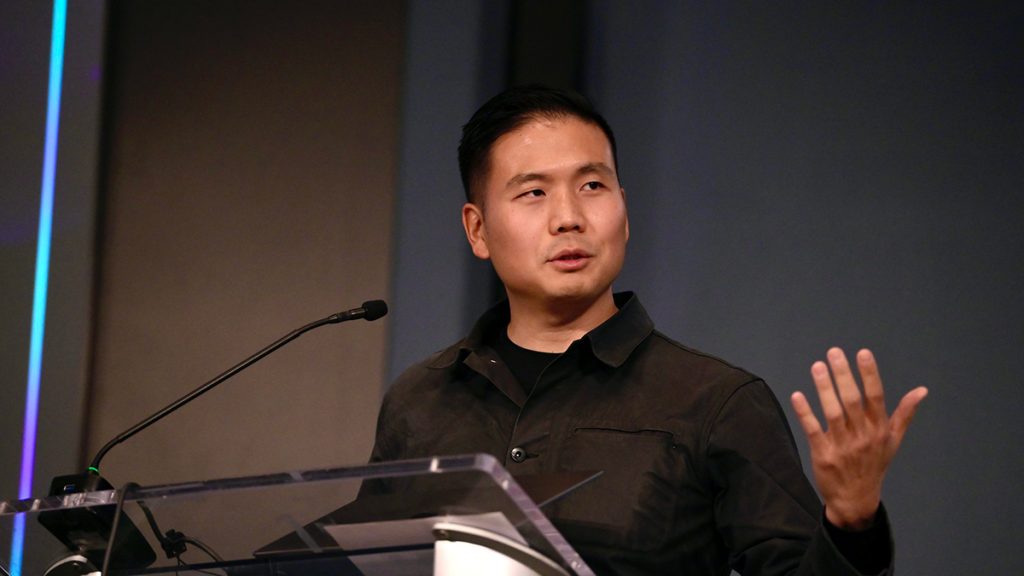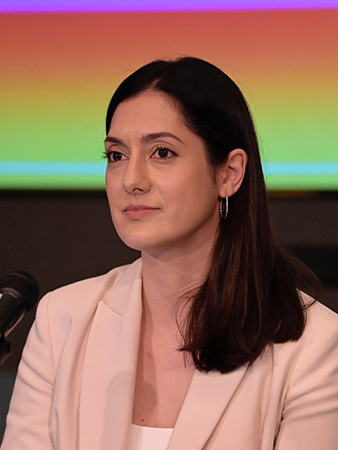
Marcus Yam
Journalism, law, the military and mental health converge at symposium co-hosted by Reynolds Journalism Institute
“Searching for Truth: When Media and Military Come Together” was co-hosted by RJI and the Mizzou School of Law’s Veterans Clinic
On Friday, April 19, experts in journalism, whistleblower laws and war crimes gathered at the Missouri School of Journalism’s Reynolds Journalism Institute (RJI) to discuss what happens when media and the military come together.
The Veterans Clinic Symposium was co-hosted by RJI and the University of Missouri School of Law’s Veterans Clinic. Kicked off by a keynote address from Marcus Yam, a photojournalist and foreign correspondent for the Los Angeles Times, the event featured a full day of panels focused on issues like maintaining mental health when covering war zones and the complexities of exposing and investigating war crimes.
“Our panelists gave us some great insights into the delicate balancing act of fostering collaboration while acknowledging the inherent tensions between journalists and the military,” said Randy Picht, executive director of RJI.
In the keynote address, Yam described the evolution of his war photography, which began with his coverage of the Eisch family — two young boys of a single parent deployed to Afghanistan in 2010. He most recently spent time in Gaza covering the Israel-Hamas war.
The gist of my work hasn’t been so much the ‘bang bang’ — I’ve tried to focus on civilians and on the impacts of war.
Marcus Yam
“The gist of my work hasn’t been so much the ‘bang bang’ — I’ve tried to focus on civilians and on the impacts of war,” Yam said, visibly moved after sharing a video of the Eisch family.
Yam described difficulties working with the military in active war zones, as well as the logistics of transportation and information gathering during times of upheaval. From his time in Afghanistan, he recounted covering the chaotic withdrawal of American soldiers as the Taliban recaptured the capital city of Kabul.
“I remember coming up as a journalist and reading about Vietnam and the fall of Saigon,” Yam said. “[On Aug. 15 in Kabul,] I was astounded. It was like the echoes of Vietnam coming back.”
A thread that ran through the entire symposium was the importance of support for mental health for both journalists and service members. In one panel specifically focused on mental health, School of Journalism doctoral candidate Teodora Trifonova shined a light on the struggles faced by “fixers,” the people who often help journalists in foreign countries with tasks like translating, arranging interviews and providing background information.
“Their work is vital but is hidden from the public,” Trifonova said, emphasizing that fixers are often exposed to the same traumatic events as journalists but receive comparatively little recognition or support. “They do not appear on television and most of the time do not appear in the credits of stories.”
Her comments were drawn from research she is conducting with Assistant Professor Joy Jenkins into the foreign correspondents from central and eastern Europe covering the war in Ukraine.
Another panel included Dan Clare — the whistleblower who brought attention to the burn pits that exposed service members in Iraq to toxic fumes — alongside journalist Kelly Kennedy, to whom he broke the story. While Clare said he had not faced much in the way of repercussions, whistleblower lawyer Mary Inman noted that is not the case for everyone.
“I’ve lost two clients to suicide,” Inman said. “It informed me to very much tell my clients now, ‘this is what you can expect.’ …If I’m doing my job, I’m talking them out of it in many cases.”
Inman added that stronger collaboration between media and lawyers could help limit harm.
“I think there is too much division between lawyers and journalists,” Inman said. “We work really successfully with journalists, but there need to be some creative solutions here, because the victims are whistleblowers so much of the time.”
I look in places people are sharing information they don’t realize is publicly available. When you think from a journalistic research perspective about how you get information, it’s not just, ‘people are on TikTok.’ Well yeah, duh. But how do you get to the backdoor of interesting information through other things, too?
Aric Toler
Finally, a panel moderated by Veterans Clinic Director Brent Filbert dived into the world of investigating war crimes. Aric Toler, a reporter for the New York Times whose work has exposed Russian espionage, war crimes and gaps in the U.S. intelligence community’s information security, described the sometimes surprising ways that potential war crimes and other information can be discovered, noting that even nuclear secrets have been inadvertently exposed through online flashcard websites.
“I look in places people are sharing information they don’t realize is publicly available,” Toler said. “When you think from a journalistic research perspective about how you get information, it’s not just, ‘people are on TikTok.’ Well yeah, duh. But how do you get to the backdoor of interesting information through other things, too?”
Though panelists throughout the day did not always agree, as when Clare and Inman debated how closely the motives of whistleblowers and “leakers” should be scrutinized, the overriding sentiment was of a desire to foster collaboration between the various disciplines that intersect with war and human rights. Brent Filbert, in closing out the symposium, pointed out that the need for that collaboration won’t be going away any time soon.
“When I was growing up, you always thought, well, there was a war, but there isn’t going to be one like that again,” Filbert said. “But it just keeps happening, and so the journalists, the whistleblowers, the lawyers who are representing veterans and active duty personnel are all important, they are all relevant, and they will always be needed.”
About the MU Veterans Clinic
Students in the University of Missouri School of Law Veterans Clinic help veterans and their families secure disability-related benefits. Student work is primarily focused on veterans’ benefits cases, as well as discharge upgrades.
Since its inception in 2014, the clinic has provided guidance to over 1300 veterans and family members. The clinic is run like a law firm, providing Mizzou Law students with an experience designed to prepare them for the practice of law while securing retroactive monetary benefits for our nation’s veterans. To date, the clinic has recovered in excess of 12.5 million dollars for its clients.
Cite this article
Fitzgerald, Austin (2024, April 25). Journalism, law, the military and mental health converge at symposium co-hosted by Reynolds Journalism Institute. Reynolds Journalism Institute. Retrieved from: https://rjionline.org/news/journalism-law-the-military-and-mental-health-converge-at-symposium-co-hosted-by-reynolds-journalism-institute/

